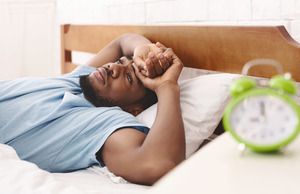
Sleep apnea can cause your breathing to repeatedly stop and restart throughout the night, resulting in poor-quality slumber. If you want to avoid the most severe consequences of the disorder, you’ll naturally want to have it treated quickly. At the same time, you should also make sure you’re aware of any factors that could make the problem even more severe so that you can take the proper steps to address them. Below is a closer look at 4 things that can make sleep apnea worse.
1. Being Overweight
It is estimated that 7 out of 10 patients with obstructive sleep apnea are obese. Being overweight often means there’s an increased presence of fat deposits around your neck, which can collapse and block the upper airway while you’re asleep, resulting in sleep apnea episodes. In many cases, taking steps to lose excess weight – such as changing your diet or engaging in regular exercise – can go a long way toward making sleep apnea less severe.
2. Sleeping on Your Back
When you sleep on your back, gravity can cause your tongue and soft palate to fall back and potentially block your airway. It’s therefore recommended that you avoid sleeping on your back after you’ve been diagnosed with sleep apnea. Try training yourself to sleep on your side instead in order to keep your airway open at night; one way to do so is to attach a tennis ball to the back of your pajamas, which will prevent you from rolling over in your sleep.
3. Drinking Alcohol at Night
One of the effects of alcohol is that it causes your muscles to relax. Unfortunately, this includes the muscles around your airway, which can end up blocking the flow of air. As such, if you know that you have sleep apnea, it’s in your best interest to avoid consuming alcohol for at least three hours before your regular bedtime.
4. Certain Types of Prescription Medication
If you’re taking any kind of medication, you should double-check to make sure that it doesn’t have any side effects that might be worsening your sleep apnea. For example, opioids can sometimes cause respiratory suppression, which can easily lead to breathing problems during the night. Be sure to talk to your regular physician if you’re worried that your medication might be contributing to your sleep disorder.
Once you’re aware of the factors that can contribute to sleep apnea, you can make the appropriate changes to your lifestyle so that you can improve the quality of your sleep. When you see your dentist for sleep apnea treatment, don’t be afraid to ask if they can suggest any other steps you can take on your own to address your symptoms and enjoy more restful nights.
About the Author
Dr. Rashpal Deol started practicing dentistry in India before eventually moving to the United States. He is pursuing Mastery status with the American Academy of Dental Sleep Medicine, and he belongs to the American Board of Dental Sleep Medicine. He is skilled in helping patients overcome their sleep apnea with customized oral appliances. To schedule a consultation with Dr. Deol at Oak Ridge Dental in San Ramon, visit his website or call (925) 735-6190.




